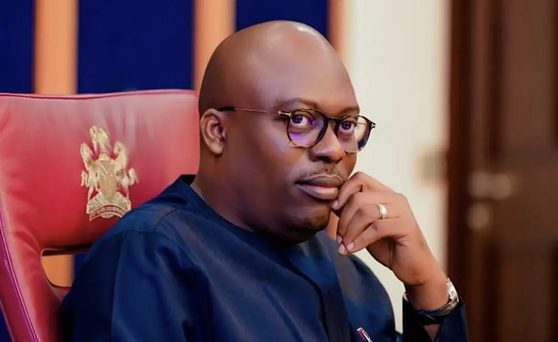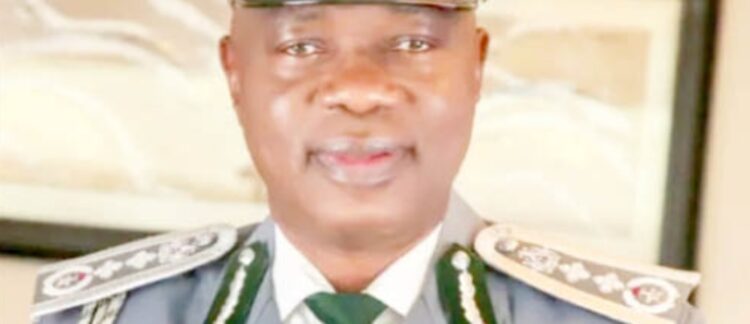News
Fubara goes ahead to present budget to 3 lawmakers, snubbing court verdict

Again, Rivers State Governor Siminalayi Fubara is set to present the 2025 budget to a three-member faction of the State Assembly, ignoring Court verdict.
This move comes despite a recent Federal High Court ruling that deemed last year’s budget presentation to the same three-member body invalid.
Since October 2023, Rivers State has faced political unrest following an attempted impeachment of Fubara by a faction loyal to Wike, now Minister of the Federal Capital Territory. An explosion subsequently damaged the state assembly complex, deepening the crisis.
Fubara, expressing confidence in his relationship with the 10th Assembly under Speaker Victor Oko-Jumbo, has praised the Assembly’s quick action on executive bills and stated he expects similar support for the 2025 budget. At recent events in Bonny Local Government Area, Fubara emphasized his administration’s partnership with the assembly and criticized the 25 lawmakers aligned with Wike as “Abuja-based politicians” disconnected from their constituents.
In a related thanksgiving service on Sunday, Fubara expressed gratitude for the challenges his administration has faced, seeing them as a “divine redirection” for Rivers State. He pledged continued governance under “the fear of God,” assured of his administration’s resilience amid adversity, and donated N100 million to support local church initiatives.
News
Reps Congratulates Nigerians At Christmas, Advocate Unity, Love, Peace

By Gloria Ikibah
The House of Representatives has congratulated Nigerians for celebrating the birth of Jesus Christ and the timeless message of hope, peace, and love associated with the season.
in a statement by the House Spokesperson, Rep. Akin Rotimi, he said “Christmas serves as a reminder of values that bind us together as a nation: compassion, generosity, and forgiveness. These virtues, as demonstrated by Jesus Christ, are crucial not only for spiritual growth but also for promoting harmony and progress in our diverse society”.
Speaker of the House, Rt. Hon. Abbas Tajudeen, PhD, GCON, congratulated Christians on this special occasion, urging Nigerians to embrace unity, love, and peace, transcending religious and ethnic boundaries. He described the birth of Jesus Christ as a symbol of renewal and fulfillment, calling for a collective effort towards a national rebirth, especially in these challenging times. He encouraged prayers for a better Nigeria and support for the country’s leaders at all levels.
Deputy Speaker, Rt. Hon. Benjamin Okezie Kalu, emphasized the essence of Christmas as a time to reflect on the values of love, forgiveness, and selflessness embodied by Jesus Christ. He urged Nigerians to extend kindness and compassion to one another, particularly to those in need.
The 10th House of Representatives reaffirmed its commitment to the welfare of all Nigerians and prayed that the joy of Christmas would strengthen bonds of unity and love across the nation.
Wishing all Nigerians a Merry Christmas and a season filled with hope and happiness.
News
Customs disolves border patrol team amidst smuggling, brutality allegations

The Nigeria Customs Service (NCS) has announced the dissolution of its Joint Border Patrol Team (JBPT).
The Public Relations Officer of the NCS, Abdullahi Maiwada, in a statement Tuesday, said the decision was made after due consultation with the office of the National Security Adviser (ONSA).
The House of Representatives had, on December 11, mandated its Committees on Customs and Excise, Defence, to investigate the operations and activities of the NCS across the nation’s borders over alleged complicity in aiding smuggling and involvement in brutality against Nigerians.
The committees were also directed to examine the role of military personnel attached to Customs patrols in order to ensure their operations comply with legal frameworks and human rights standards.
Foundation secures release of 40 inmates
Keep faith with Tinubu’s govt, Southern senators urge Nigerians
The resolutions followed the adoption of a motion of urgent public importance by Rep. Sesi Whingan who alleged that rather than prevent smuggling, recent reports showed that Customs’ personnel across the borders were aiding and abetting smuggling.
But the Customs spokesman explained yesterday that the dissolution of the joint border patrol team was part of the NCS’ efforts to strengthen border management and reinvigorate its 2025 enforcement strategy.
The JBPT, coordinated by the ONSA, evolved from an ex-swift response team to become a tripartite operation comprising Benin Republic, Niger Republic and Nigeria.
The patrol team was tasked with combating smuggling, irregular migration, and other transnational organised crimes along the nations’ borders, among others.
Maiwada said the team’s dissolution would not compromise border security or trade facilitation, but represents a significant step towards modernising Customs’ operations, improving trade compliance and strengthening national security.
The NCS said the move was part of the organisation’s ‘2025 enforcement strategy’.
“This strategy is aimed at removing bottlenecks associated with trade, strengthening border security, combating smuggling, and facilitating legitimate trade,” he said.
Maiwada also disclosed that Adewale Adeniyi, NCS Comptroller-General, had approved the reduction of customs checkpoints across the country to streamline its operations and to ease movement of goods and persons.
According to the statement, Adeniyi said the NCS would shift reliance to intelligence.
“Moving forward, customs operations will rely more on actionable intelligence and strategic risk management frameworks to enhance efficiency and effectiveness,” the statement quoted the CG as saying.
News
Nigerians Are In Pains Because We Chose Darkness In Place Of Light — Bishop Kukah

The Catholic Bishop of Sokoto Diocese, Matthew Kukah, has stated that Nigerians are pains because they refused to be liberated from “darkness.”
The priest said this in his Christmas message at the Holy Family Cathedral Catholic Church, Sokoto Diocese on Tuesday night.
He emphasised that embracing transparency, accountability, and integrity in public service, politics, and individual conduct could significantly improve the country’s current state.
He said, “Nigeria’s lack of visible and measurable progress is tied to the fact that we have chosen darkness rather than light.
“Imagine if we let the light shine on our public service, on our politics, on our individual, community, and national life, and on our public institutions. Imagine what Nigeria would be like if we chose light instead of darkness.
“They will know we are Christians by our love,” highlighting that the country’s journey to greatness remains constrained by ethnicity, nepotism, and greed.
“We are still unable to embrace the ideals of our national anthem that says: ‘Though tribe and tongue may differ, in brotherhood we stand.’ Diversity is a gift from God. Let us use it effectively as a tool for national mobilization and cohesion,” he advised.
Kukah also lauded the passage of the “Not Too Young to Run Bill” in 2018, which opened doors for increased youth participation in politics.
However, he acknowledged the ongoing challenges, such as the high costs of political participation and issues of internal democracy, which still hinder young people’s active engagement.
He also commended the enactment of the Student Loan Act 2024 and the establishment of the Nigerian Education Loan Fund by the federal government.
These initiatives, he noted, have the potential to expand opportunities for Nigerian youth, including those pursuing vocational and technical skills.
“It is significant that the Act does not limit access to university students alone. We hope this project will be free of bureaucratic bottlenecks and favoritism, ensuring that poverty does not exclude anyone from receiving a good education,” Kukah said.
He encouraged the youth to take full advantage of these opportunities while also expressing concern about the ongoing security challenges in the country, which he described as a persistent obstacle to national stability.
Kukah, however, called on all Nigerians to choose the path of light, unity, and love, stressing that these values are essential for the nation’s progress and development.
-

 News23 hours ago
News23 hours agoBREAKING: Human Rights Lawyer Dele Farotimi Released
-

 News10 hours ago
News10 hours agoEx-Presidents’ wives lament disrespect after husbands’ tenure
-

 News24 hours ago
News24 hours agoNASC backpedals reverses Atiku’s appointment as DCNA, replaces him with Yero
-

 News22 hours ago
News22 hours agoWATCH moment Tinubu hails FCT minister for his doggedness, sterling performance
-

 News10 hours ago
News10 hours agoFG workers face gloomy Christmas over delayed Dec salaries
-

 News10 hours ago
News10 hours agoInsecurity: Why I Will Not Probe Security Chiefs – Tinubu
-

 News10 hours ago
News10 hours agoI’ve never lied against anyone, says Dele Farotimi after regaining freedom
-

 News23 hours ago
News23 hours agoSpeaker Abbas Salutes APC National Chairman, Ganduje, @ 75








